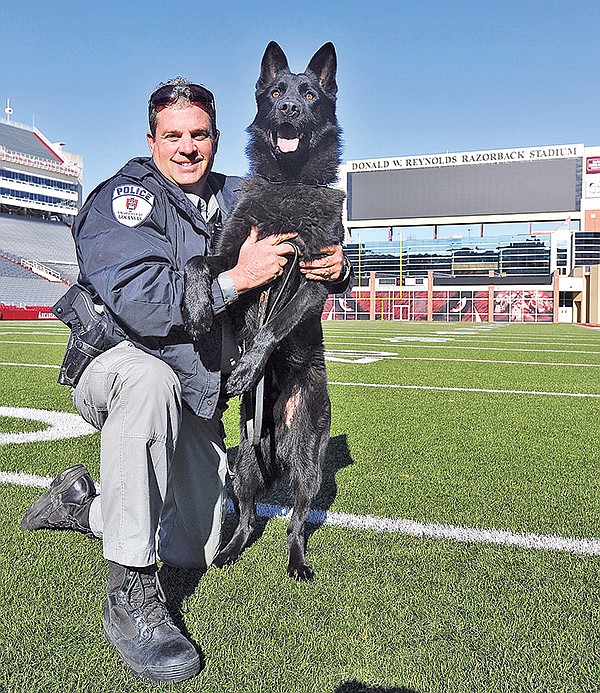Furry Ball of Energy Joins University Of Arkansas Police Department
Black German Shepherd Detects Explosives
STAFF PHOTO MICHAEL WOODS Cpl. Chris Krodell and his police dog partner Orry with the University of Arkansas Police Department pose for a photo Friday at Reynolds Razorback Stadium in Fayetteville. Orry is the newest police dog in the UA Police Department.
Monday, December 30, 2013
FAYETTEVILLE — Cpl. Chris Krodell described his new partner at the University of Arkansas Police Department as “a ball of energy.”
Krodell and his police dog, Orry, have been working together for six weeks. The 80-pound black German shepherd is a dual-purpose explosive detection and patrol dog.
At A Glance
Registration Papers
The German Shepherd Breed Club in Europe will issue registration papers on a dog if the following requirements are met:
Working titles on both parents
Both parents are required to have an endurance title
Both parents must have certified elbow, hip score and DNA on file
Both parents must have a show title
Both parents must have a breed survey
A breed warden must visit the litter, and they must be tattooed by the German Shepherd Breed Club, with an assigned number.
Source: Von der Haus Gill German Shepherds & Police K9 Academy
“He’s a show-stopper,” Krodell said. “He can bite hard, but he’s very friendly. He still has a lot of puppy in him.”
Orry is one of four K-9 dogs owned by the department.
Leah is a 2-year-old Dutch shepherd and Orno is a 7-year-old German shepherd. Both are dual-purpose explosive detection and patrol dogs.
Dingo is a 5-year-old German shepherd and he works as a dual-purpose narcotics and patrol dog.
Krodell, who’s been with the department for six years, also handles Orno.
“He’s a senior citizen, but he’s still with the department,” Krodell said. “Right now, I use both dogs interchangeably. Orno will probably retire in a year or two.”
Krodell said the average career of a police dog spans five to eight years, depending on the dog.
The university dogs and their handlers receive training at Von Klein Stein Working Dogs in North Little Rock.
Head trainer Criss Gardner, who also works as a police dog officer for the North Little Rock Police Department, said most police dogs are imported from Europe.
To qualify as a police dog, Gardner said dogs must have “working titles,” which means each parent has had a specific job. They must also have a good breed rating, which is determined through structural, medical and temperament testing. Only seven puppies from a litter can be registered.
“In the United States, we tend to mess up police dogs,” Gardner said. “You may have a female German shepherd with temperament problems and I might have a male German shepherd with lop ears and missing teeth, but we could still breed them and get their papers. In Europe, if there’s a character fault, they can’t be bred.”
Gardner said he, and two other trainers, teach dogs tracking, bite work, obedience and odor detection. Initial training usually takes about a month. Within two weeks, he schedules handler training.
Training a police dog is a “forever thing,” Gardner said.
“We’re like the basic academy,” he said. “Once we train them, they go back to their department and apply what we’ve taught them.”
When he’s on duty, Krodell said he gives Orry commands in German because that’s how he was trained.
He said the university is one of only a handful of police agencies in Arkansas that own explosive detection dogs.
“I have the best job in the world,” Krodell said. “I get to work with a dog every day.”
Other agencies in Northwest Arkansas that have explosive detection dogs include Bentonville and Arkansas State Police.
State Police Capt. Lance King said his agency has one explosive detection dog, which is used for high-risk search warrants, building searches and SWAT calls.
“The dog takes the place of a police officer,” King said. “They can smell better and they take commands.”
State Police Cpl. Eric Shrock said his Belgian shepherd Malinois, Marsoc, has been in service for 11 months. He’s a dual-purpose explosive detection and patrol dog.
“We use him for perimeter searches and for clearing entries,” Shrock said. “I haven’t had to utilize him on a search for explosives yet, but he has been on several SWAT call outs throughout the state. If another agency is in a pursuit and needs a tracking dog, we assist them any time we can.”
Gardner said he tries to match the right dogs with the right departments.
The most popular breeds are German shepherds, Belgian Malinois and Dutch shepherds.
“The UA is a little different than some of the other agencies,” he said. “They’re around a lot more people so they need a very social dog.”
Krodell said the university uses its explosive detection dogs to search venues before large-scale events, like football games.
The agency purchased its first two police dogs five years ago for $16,000, he said.
Right now, Krodell said Orry is doing ride-a-longs so he can get used to riding in his patrol car.
“Dogs are a lot like people,” he said. “Some catch on faster than others.”
